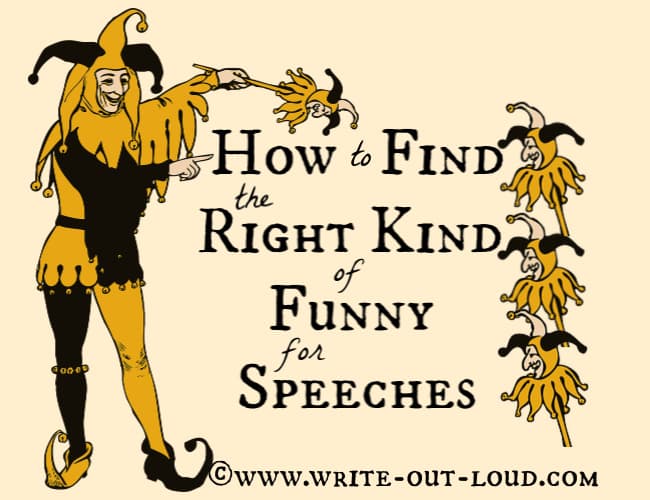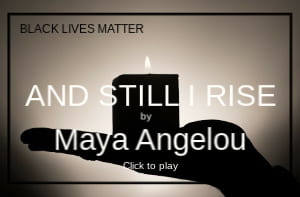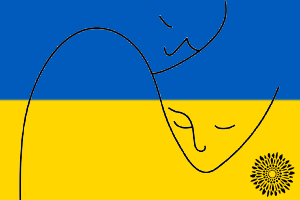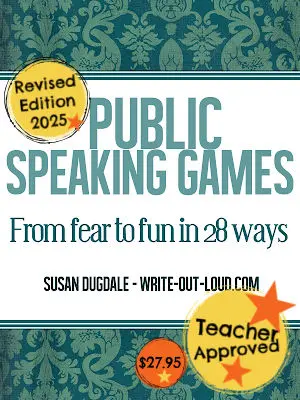Types of verbal humor
An overview of 17 ways to add humor to make your words sound, and be, funny ha-ha ☺
By: Susan Dugdale
Varying types of verbal humor are used liberally by comedy writers to get a laugh.
You may be familiar with a few of these word plays. Perhaps, you use them yourself in your everyday conversations or speech writing.
But wait, there's more, a whole lot more...
Here's an overview of 17 differing sorts of verbal comedy, with examples.
It's an introduction, enough, I hope, to tempt you to try something new, to add variety to your laughter menu.

1.Pun fun
A pun is a play on words, in which a word of multiple meanings, or a word of similar sound but different meaning, is used to create the joke.
It is probably the commonest form of verbal humor, and often the most derided. Think 'Dad' jokes and their reception. It's usually a mix of rolling eyeballs and groans.
Examples of puns
Heard about the fight down town? It was called a shopping maul.
An old teacher never dies. They simply lose their class.
Without geometry, life is pointless.
2. Innuendo or double entendre
An innuendo is an indirect, often very derogatory hint, flagging an alternative meaning.
The speaker appears entirely innocent and the innuendo is ‘discovered’ in mind of the listener. The most frequent of these are sexual innuendos or double entendre.
The second meaning, often achieved through a pun, is intentional.
Examples of innuendo
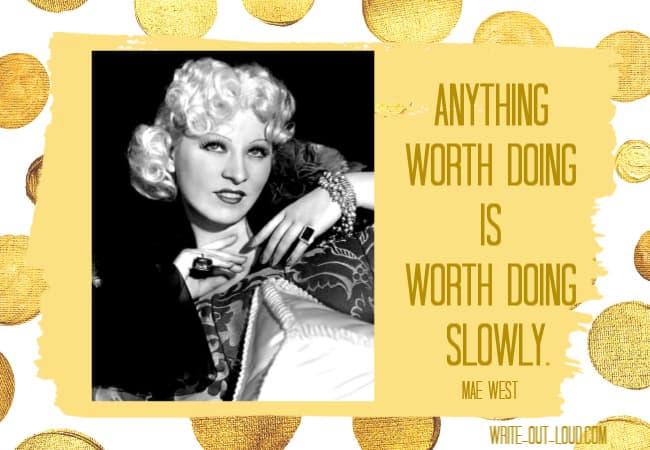
Mae West, American actress, singer, playwright, screen writer and sex symbol is famous for her use of innuendo.
Is that a gun in your pocket or are you just pleased to see me?
I speak two languages: body and English.
Between two evils, I always pick the one I've never tried before.
3. Malapropism
A malapropism is created through either the intentional or unintentional misuse of a word - substituting the 'right' word for another with a similar sound.
It derives its name from a character (Mrs Malaprop) from Richard Sheridan's 1775 play, The Rivals. Mrs Malaprop's substitutions of one word for another were not intentional. And that, of course, was part of what made her a comic character.
Examples
Pink and yellow concubines twined around the trellis.
(Pink and yellow columbines twined around the trellis.)
My sister has extra-century perception.
(My sister has extra-sensory perception.)
The statue of Liberace and the Star Strangled Banger.
(This last gem was in a student essay and completely unintentional. What the girl intended was 'The Statue of Liberty and the Star Spangled Banner'. I've mentally thanked her for her error over and over again. ☺)
4. Spoonerism
A spoonerism is an either intentional or unintentional transposition of the sounds of two or more words.
It takes its name from the Englishman credited with making them famous - Oxford professor William Spooner. Apparently his were genuine slips of the tongue.
Examples of spoonerisms
You have hissed all my mystery lectures.
(You have missed all my history lectures.)
He delivered a blushing crow.
(He delivered a crushing blow.)
Let's raise a toast to our queer old Dean.
(Let's raise a toast to our dear old Queen.)
5. Mixed metaphor
Mixed metaphors are the confusing/amusing result of combining well known clichés or sayings.
Examples:
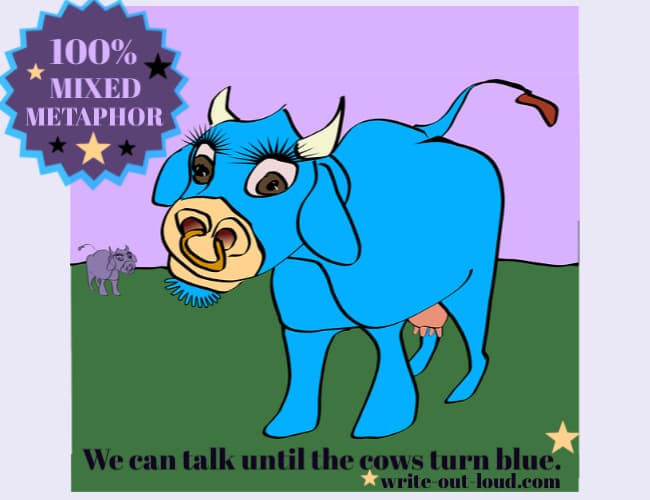
We can talk until the cows turn blue.
This blends two clichés: 'talk until the cows come home' and 'talk until we are blue in the face'. Both mean to talk for a very long time without reaching resolution or agreement.
He's not the smartest kid in the toolbox.
This mixes the saying 'the smartest kid on the block' with another, 'the sharpest tool in the toolbox'. Both mean the most intelligent.
6. Joke
A joke is something said or done to evoke amusement or laughter. In verbal humor the term often means an amusing story with a punch line - a humorous ending.
There are squillions of them of many, many varieties. Put the word 'jokes' into a search engine and you'll see what I mean!
Here's one I enjoy as an example.
A joke about a mouse
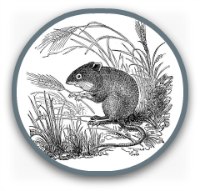
A mother mouse and a baby mouse were walking along, when all of a sudden, a cat attacked them. The mother mouse yelled, "BARK!" and the cat ran away.
"See?" said the mother mouse to her baby. "Now do you understand why it's important to learn a foreign language?"
7. The extended or running gag
An extended or running gag is an amusing situation or line recurring throughout a story or performance.
Examples of running gags
The Goon Show , the famous British (1950s -1960s) radio comedy show, which I listened to as a child had multiple repeated lines running through all its episodes. The one I remember most, because it reduced me to helpless giggles every time I heard it, was "He's fallen in the water."
The series, a collaboration between Peter Sellers, Harry Secombe and Spike Milligan, is anarchic absurdist brilliance.
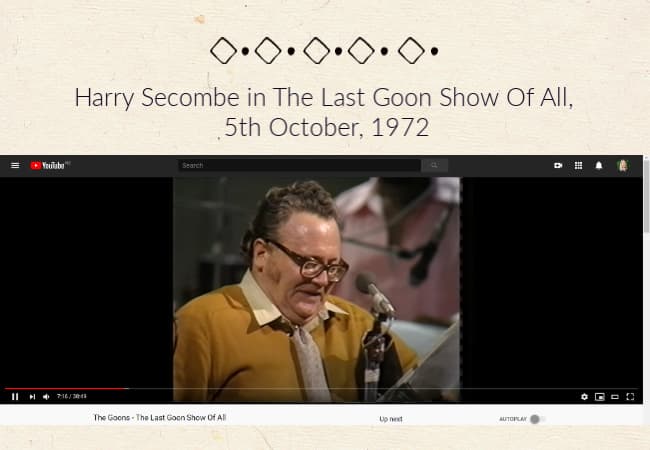
Fortunately the last time they ever performed together was filmed. Click The Last Goon Show of All to see an edited version I found on YouTube. (Thank you for posting it.)
Monty Python's Flying Circus, a wonderful British TV show, out of a similar surreal anarchic mold to The Goon Show, ran the line 'And now for something completely different' through its episodes. Later the phrase was used as the title of a film: And now for something completely different ...
For more examples see whatculture.com writer Brendan Morrow's article: 10 Hilarious TV Running Gags That Lasted An Insanely Long Time.
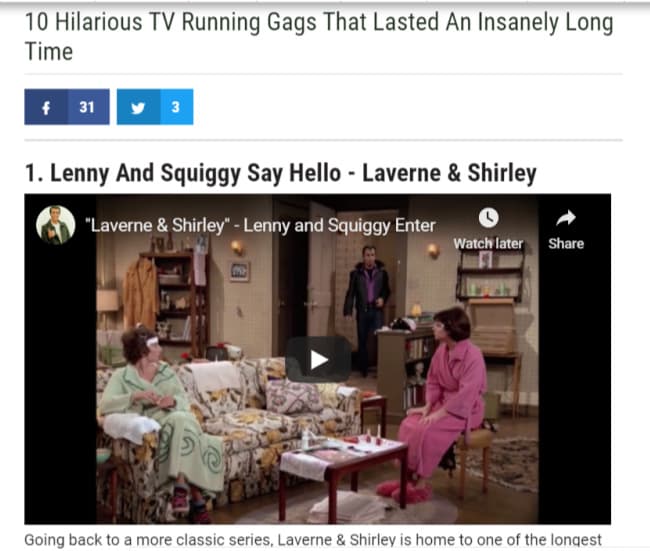
8. Shaggy dog story

This is a long rambling story filled with irrelevant detail and repeated phrases finishing with an absurd anti-climatic punch line.
It leads its listeners on in the expectation there will be an ending to make sense of all they’ve endured. Often there isn’t, or it will be an excruciatingly weak pun.
Its pointlessness is the joke, along with the con trick played on the audience, who gave up their ears and time to listen.
To read some real groaners check this US Scouting site.
If you want to know more about them, read this explanation from worldwidewords.org's founder and writer Michael Quinion about how a shaggy dog story got its name.
9. Parody
To parody is to copy or imitate for comic affect the style of something or someone else. By its nature parody exaggerates and sometimes unkindly, mocks the original.
It only works if the person or thing (song, poem, story etc., being copied is well known to the audience.
An example of parody
All the variations based on The Ten Commandments, which are fundamental to the Abrahamic religions: Judaic, Christian and Islamic, are recognized for what they are.
I've seen versions of 'Ten Commandments' for teachers, cooks, children, husbands, wives, shopkeepers, office workers, and cats. Even for babies.
The pearl below was a serious offering in 1947: one of ten commandments for wives to foster happily married bliss. Thankfully equality was observed. There are ten for husbands too.
You may read them all here: Miss Abigail's Time Warp Advice: ten commandments for wives and husbands.
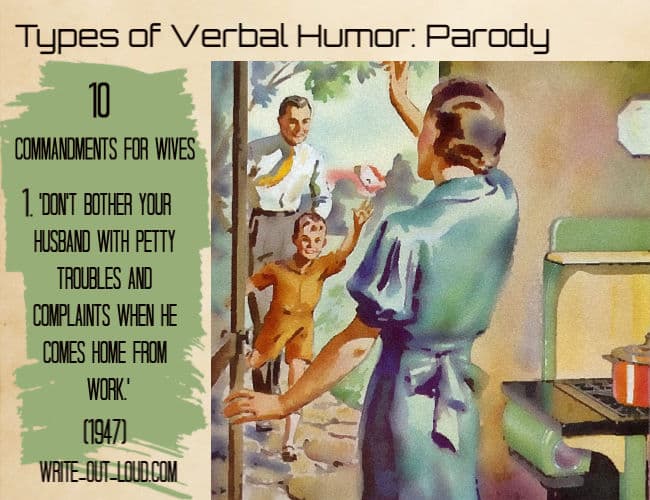
10. Satire
Satire is used to expose silliness, foolishness or stupidity through ridicule. It attacks, not just for a laugh, but with the aim of alerting its audience to society's problems and to make way for reform.
The form has its roots in antiquity. Today it is alive and thriving in many areas: literature, art, cartoons, theater, film, TV ...
Well known examples of satirical literature are:
- Animal Farm and 1984 by British writer George Orwell
- Fahrenheit 451 by Ray Bradbury
- Catch 22 by Joseph Heller
Examples of satirical TV shows:
And here's a visual example, a satirical cartoon.
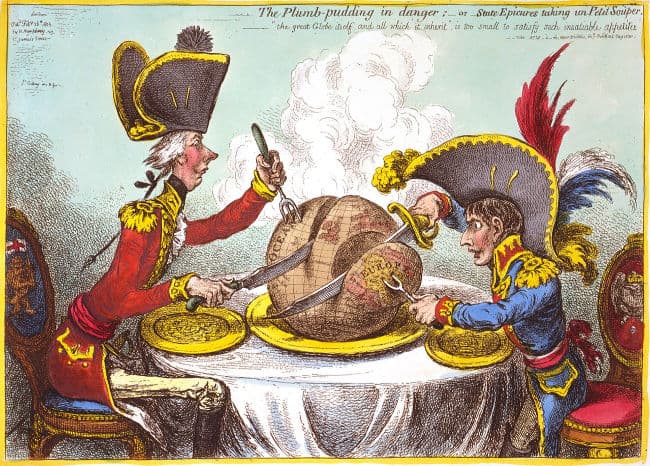
The Plum Pudding in Danger by James Gillray was published in London in 1805.
William Pitt, Prime Minister of Great Britain, (left), and Napoleon Bonaparte, Emperor of France, (right), are sitting down to carve themselves slices of the world.
The small print beneath the title says: "The great Globe itself and all which it inherit [sic], is too small to satisfy such insatiable appetites."
For more information on satire read this excellent article A Brief History of Satire by Matt Reimann.
11. Irony
Irony is using words to imply the opposite of their literal meaning, or a situation where the outcome is the opposite from that intended or expected.
Irony and sarcasm are often regarded as being synonymous, the same.
However sarcasm implies a stronger, deliberately cutting remark. The intent behind it is malicious: to ridicule and insult.
Examples of verbal irony
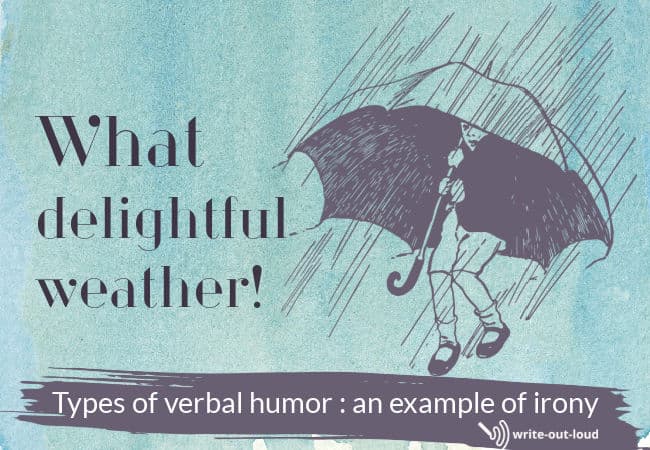
'What delightful weather!’ – said while walking through a rainstorm.
'This is about as useful as a chocolate teapot!' - said about something that is entirely unfit for purpose.
'She had all the delicacy of an elephant in a strawberry patch.' - said about someone who tramps all over other people's feelings.
Examples of situational irony
The plumber whose taps at home leak, the teacher's child who plays truant or the butcher who is a vegetarian.
An example of sarcasm
Mary is a thoroughly delightful woman.
She has a delightful figure, a delightful dress sense, a delightful brain and, an equally delightful husband to match.
So much delight is entirely overwhelming. Therefore I must decline her invitation to dinner.
12. Overstatement

Overstatement is deliberately maximizing a subject, making it much more than it actually is.
It is also called hyperbolic exaggeration.
Examples:
- She is the most beautiful woman in the entire world.
- I am so hungry I could eat a horse.
- It cost the earth, or an arm and a leg.
And of course, the classic example familiar to parents every where:
- 'If I've told you once, I've told you a million times!'
13. Understatement
Understatement is deliberately minimizing whatever is being spoken about, often absurdly. Generally, the audience knows and that is what makes it amusing.
Examples of understatement
Oh, it's a mere trifle! - used to describe an expensive piece of jewelry.
Not very friendly ! - used to describe abusive, aggressive behavior.
Just a little scratch! - used to describe major injuries.
I guess I did OK! - used after having scored the highest marks in class on a test.
14. Statements of the obvious
The statement made is an observation that most people would never make because regardless of the subject, the comment highlights what most regard as normal or expected - i.e. *unworthy of comment!
A statement of the obvious is generally delivered dead-pan or straight-faced.
*trite-out-loud ☺
Examples of statements of the obvious
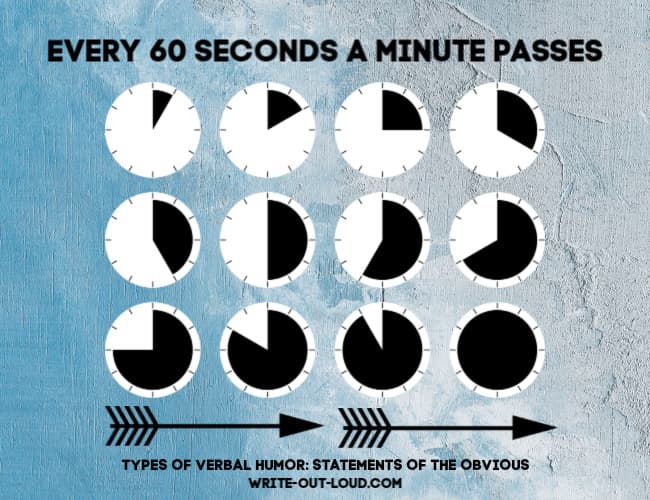
Every 60 seconds, a minute passes.
This water is particularly wet.
Cats don't bark.
A warning label on a baby stroller: "Remove child before folding".
People who live longer have more birthdays.
Please open the door before entering.
15. Exclusive humor
Exclusive humor is specific to a particular group of people brought together through something they share in common. For instance work, sport, a hobby, religion, nationality, gender or race.
Outsiders find it hard to understand because they do not share the experience it draws on. Invariably it uses its own vocabulary (jargon) as well.
Sometimes jargon is amusing precisely because we don't know what is being spoken about, and the words sound funny to our ears.
Examples of exclusive humor
Here's a ridiculous gobbet of business jargon which could have come straight from The Office.
"Get six alpha pups in here to get the full optics on the situation."
Translations:
- alpha pup = a trendsetting young person
- full optics = a complete overview
For more gems of business or work place gobbledygook see The Ridiculous Jargon Dictionary.
Sporting jargon
Many sports have wonderful jargon words and phrases.
Here's an example from that game beloved through many English Commonwealth countries, present and past, cricket.
"He was out for a golden duck!"
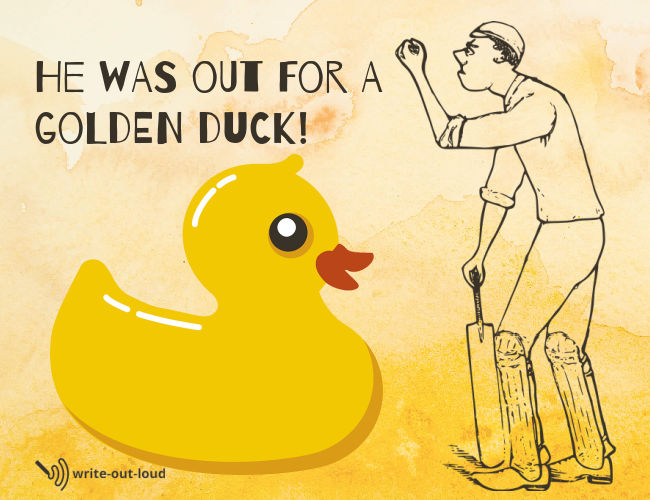
Translation:
To be out for 'a duck' means the batter got out without scoring. Out for 'a golden duck' means to be out on the first ball of an over. (An over is a set of six consecutive balls (bowls) from a bowler.)
16. Absurdity
Absurdity is humor obviously lacking in reason. It is foolish or ridiculous and often includes the use of nonsensical language.
Absurdity makes anything preposterous, incongruous, fantastical or whimsical, feel right at home.
Examples of absurdity
From television, the British show Monty Python's Flying Circus and the American show The Simpsons.
The elephant jokes I thought were hilarious as a child
- Why did the elephant paint its toe nails red?
Answer: To hide in the strawberry patch. - What do you call an elephant with a machine gun?
Answer: Sir!
And Edward Lear's much loved poem The Owl and the Pussy-Cat.
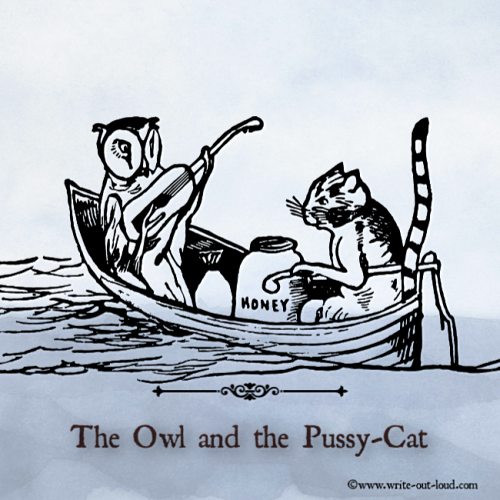
This link will take you to a page of six wonderful nonsense poems for kids of all ages. The selection includes the Owl and The Pussy-Cat, who went to sea in a beautiful pea-green boat.
You'll find the full text of each poem, audio recordings, activities, and a freebie printable to download of all the poems.
17. Sounds in verbal humor
The sounds words make either by themselves, or in sequence, adds to the overall funniness.
It's an extra layer of pleasure: sound combined with meaning heightens or intensifies the humor.
Alliteration
This is the repetition of the beginning sound(s) of words.
Examples of alliteration everyone will be familiar with are tongue twisters like these:
- Peter Piper picked a peck of pickled peppers.
- She sells sea-shells on the sea shore.
- Betty Botter bought some butter, but she found the butter bitter ...
In the sentence below, which was not true, the repetition of h adds humor and drama. I could have said 'My mother-in-law is very difficult' to express the same idea. However that is completely funny-free.
My mother-in-law is a horrendous hag from hell.
Assonance
These are sequential words sharing similar internal vowel sounds.
For example:
- heed and steed
- real and meal
- float and boat
Here's an example from Dr Suess's book "The Lorax":
"So I quickly invented my Super-axe-hacker which whacked off four Truffula Trees at one smacker."
Consonance
This is the use of words with similar or the same consonant sounds.
For example:
batter, stutter, matter, splutter …
To illustrate consonance in action here is another example from Dr Suess's "The Lorax".*
"You're glumping the pond where the Humming-Fish hummed! No more can they hum, for their gills are all gummed."
(*I found both the "Lorax" extracts I've quoted above in an excellent article by Hillary Lahr: "Truffula Trees, The Lifted Lorax and The Creative Style" which discusses the importance of alliteration, assonance, consonance and onomatopoeia in capturing and maintaining the reader's interest. Thank you!)
Onomatopoeia
These are words that imitate or sound like their meaning when spoken.
Examples:
crash, bash, slam, scream, shriek, screech, sizzle, clang, cut, splatter, whisper, honk, hiss, beep, cheep ...
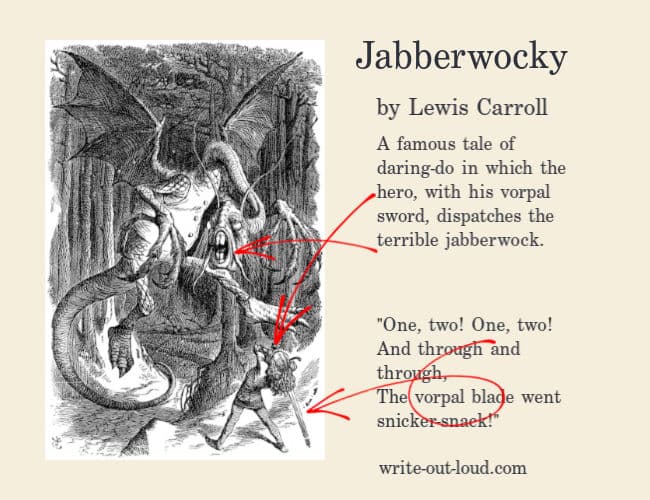
In his famous poem Jabberwocky Lewis Carroll uses nonsensical onomatopoeic words to help convey what is happening. And they work brilliantly.
For instance in this verse:
"And, as in uffish thought he stood,
The Jabberwock, with eyes of flame,
Came whiffling through the tulgey wood,
And burbled as it came!"
And these from the next:
"One, two! One, two! And through and through
The vorpal blade went snicker-snack!
He left it dead, and with its head
He went galumphing back."
We may not know the exact meaning of whiffling, snicker-snack or galumphing but we grasp the intention - the feeling created by the sound of the word said aloud.
You can read and hear "Jabberwocky" on this page: Poems for kids - 6 fabulous classic poems for children to play with.
Rhyme
To use words, usually at the ends of lines, having similar or the same sounds.
Here's an example from Dr. Seuss - the master of absurdity, with rhyme.
The rhyme scheme is very simple: couplets. The end words are rhyming pairs.
One Fish, Two Fish, Red Fish, Blue Fish
"Did you ever fly a kite in bed?
Did you ever walk with ten cats on your head?
Did you ever milk this kind of cow?
Well, we can do it. We know how.
If you never did, you should.
These things are fun and fun is good."
For more about the poem: One Fish, Two Fish, Red Fish, Blue Fish
For more on using humor please see:
- How to find the right kind of funny for speeches.
- Make 'em laugh without words - physical humor basics.
- How to use humor effectively
And for collections of humorous speech topics see:
- 188 funny how to speech topics for not-so serious demonstration speeches
- 60 fun speech topics
- 105 fun persuasive speech topics
Another useful resource article
Words that sound funny - Use these tricks to get a laugh. By Kevin Cummings, Writing for Grammar Girl
